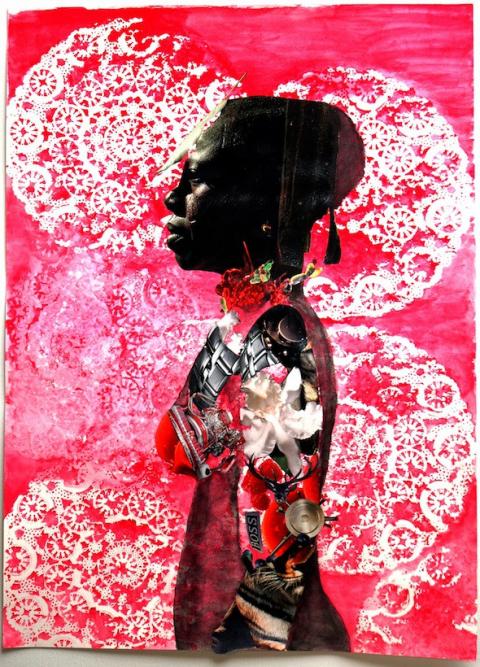The term “Afrofuturism” was coined in the 1990s by the cultural critic Mark Dery, who recognized a preoccupation with the future in the work of a number of black artists. Ever since, it has remained a term that is retrospectively applied to seemingly disparate artists, from Missy Elliot to Toni Morrison. What unites the movement is a shared fascination with the black experience, particularly in America. It is about seeing the world anew, rereading the signifiers, repurposing, remixing, refusing and recreating them. And, in so doing, Afrofuturism posits a future that disrupts the present and calls out its injustices. Krista Franklin produces poetry and visual art in the Afrofuturist tradition. Her poems and art works have been published in Black Camera, Copper Nickel, and Encyclopedia, Vol. F-K. Franklin’s work has been exhibited nationally in the U.S., and was featured on 20th Century Fox’s ‘Empire’ (Season Two). We spoke to her about her artistic interpretations of the future.TL Andrews: Let’s start with a definition. What is the best way of describing Afrofuturism?
Krista Franklin: It’s very complicated. A lot of people have a lot of varying definitions, but for the most part I would say Afrofuturism is a cultural movement that revolves around the intersection between the lives of people of color and technology, science, science fiction and speculative fiction. We look through the filter of black lives and see them through a kind of futuristic lense, using mainly science fiction or science.
TLA: It also has a strong surreal element to it.
KF: Yes it does, but you know I always try to caution against conflating those two things. Afro-surrealism is also taking a step forward in the critical theory and in the work. I like to keep the two separate because surrealism is very different from science. Surrealists are thinking about nature, they’re thinking about the subconscious mind, altered states. But I definitely understand exactly what you’re saying when you say there is an element of the surreal inside of African futurism.
TLA: What do you think is the power in surreal representations?
KF: For me, as an artist and writer, it’s a liberating space. It’s a space where I’m able to access the nuances, the subtleties, the absurdities and the strangeness of what it means to be an African American woman in the 21st century. I’m able to access a lot of dream world landscapes, things that we don’t normally encounter in our everyday lives: symbolisms, mysticisms, ancient ideas about religious pantheons. I’ve always been interested in mythology and folklore, so it would make sense for me to be drawn to the idea of the surreal. You read Greek mythology and you see there is a lot of crazy shit going on. I feel like it gives you permission as an artist to access those spaces that we don’t think are tangible or real.
TLA: What role does protest play in your work?
KF: The art of collage for me is an act of resistance. I was a child who was very influenced by the media. I loved television, I had a deep love affair with MTV when it started. A lot of the visual elements that show up in my work today came from my being very influenced by the visuals of music videos. The print media especially were also influential in the way that I saw myself. So, when I do collage, I think of it as an act of resistance. I’m deconstructing those ideas and reconstructing them and reforming them into something that most reflects how I see myself and how I see the people around me. So when we talk about protest, that’s the biggest manifestation of my protest against those who would want to see us in one particular way. I disrupt that.
Read the full interview at Berlin Art Talk.
Artist Info
Writer Info
TL Andrews is a multi-media journalist based in Berlin. He produces features for radio, television and print outlets with a focus on Berlin, Germany and European themes.


Spread the word